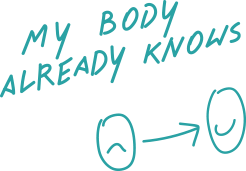Psychosomatics
Psychosomatics is the branch of medicine which, drawing on the latest scientific knowledge, also takes into account,
• the complex reciprocities and links
• between, the body, emotions, professional and personal environments
• for the process of healing and recovering from ailments and illnesses.
• the complex reciprocities and links
• between, the body, emotions, professional and personal environments
• for the process of healing and recovering from ailments and illnesses.
Psychosomatics
In the past, psychosomatics was based on a dualistic concept of the human being as a dichotomy of soul (psyche) and body (soma). Today, modern science has moved far beyond this simple division into body and soul. It now confirms an enduring, complex and constantly adapting interconnection between physical states, feelings and life experiences that never ceases to adapt. Although the guiding principles of psychosomatic thinking and action are now determined by a complex biological, psychological and eco-social concept, the term psychosomatic has traditionally remained in use.
- In the past, the term psychosomatics was used exclusively for ailments and illnesses for which no physical or organic cause could be found. It was believed that such illnesses were caused by psychological factors.
- Nowadays, psychosomatics is the branch of medicine which considers it to be both necessary and helpful for the healing and recovery processes to take into account the complex reciprocities and links between the body, emotions, and professional and private environments.
- Seen from this perspective, psychosomatics is the science and healing art of the reciprocal relationships between psychological, social and physical processes in their meaning for human health and sickness. It deals with bodily and mental processes in the sick and the healthy, manifests itself in a basic biological, psychological and eco-social attitude and is as relevant to general medicine as it is to all medical specialisations.
- The clinical specialisation of psychosomatics is a discipline which scientifically and in its care mandate addresses those illnesses in which physical, psychological, mental and social connections and interactions play a central role in the onset and perpetuation of the disorder and where they are also important for treatment. This concept of medicine is vital for the successful treatment of psychosomatic ailments.
- Psychosomatic medicine is an interdisciplinary approach in diagnostics and the treatment of illness, which goes beyond a pathophysiological perspective to include emotional factors and all the patient’s life experiences.
Treatment
Psychosomatic expertise is always called for, when
- mental and emotional distress such as anxiety, depression, burn-out or
- stressful social situations, such as bullying, relationship crises or
- physical illnesses and disabilities
- cause or aggravate stress and pain, ailments or illnesses.
Approximately one third of patients who come to a general practitioner suffer from physical ailments for which there is no apparent physical or organic cause:
- The patient feels ill or suffers from pain or ailments, but a “conventional medical examination reveals nothing”.
- Often the patient is suffering from a high level of mental and emotional stress, which can have a wide range of causes in the patient’s professional and personal life.
- Patients can spend months traipsing from one specialist to another and undergoing a host of expensive tests and examinations.
This is where a doctor with psychosomatic training is needed.
Professional societies
National
- Österreichische Gesellschaft für Psychosomatik und Psychotherapeutische Medizin (ÖGPPM)
- Österreichische Gesellschaft für Psychosomatik in der Inneren Medizin (ÖGPIM)
- Österreichische Gesellschaft für Psychosomatik in der Allgemeinmedizin (ÖGPAM)
- Österreichische Gesellschaft für Psychosomatik in der Gynäkologie und Geburtshilfe (PSYGYN)
- Österreichische Gesellschaft für Psychosomatik in der Gynäkologie und Geburtshilfe (ÖGPPG, PSYGYN)
- Department für Psychotherapie und Biopsychosoziale Gesundheit
- Gesellschaft für Psychosomatik
- Gesellschaft für Psychosomatik
- Medizinische Universität Graz Universitätsklinik für Medizinische Psychologie und Psychotherapiehttp://www.psychologie.uniklinikumgraz.at
- Medizinische Universität Innsbruck Department für Psychiatrie, Psychotherapie und Psychosomatische Medizinhttps://www.tirol-kliniken.at/
- Zentrum für Public Health Medizinuniversität Wienhttp://www.zph.meduniwien.ac.at
- Österreichische Gesellschaft für Psychiatrie und Psychotherapie (ÖGPP)
- Univ.-Klinik für Psychoanalyse und Psychotherapie
- Österreichische Balintgesellschaft (ÖBG)
- Arbeitsgruppe für Kardiologische Psychosomatik
- ARGE Psychosomatik in der HNO
- Österreichische Gesellschaft für Psychoonkologie (ÖGPO)
- Österreichische Gesellschaft für Psychologie und Psychosomatik in der ZahnheilkundePrim. DDr. Gerhard Kreyer, 3550 Langenlois, Kremser Str.9. Tel.: +43 (0)2734 2169
International
- International Balint Federation
- Deutsche Balint-Gesellschaft
- American Psychosomatic Society (APS)
- Deutsche Gesellschaft für Psychosomatische Medizin und Ärztliche Psychotherapie (DGPM)
- Deutsche Gesellschaft für Psychosomatische Frauenheilkunde Und Geburtshilfe (DGPFG)
- Deutsche Gesellschaft für Klinische Psychotherapie und Psychosomatische Rehabilitation (DGPPR)
- Deutsches Kollegium für Psychosomatische Medizin (DKPM)
- Schweizerische Akademie für Psychosomatische und Psychosoziale Medizin (SAPPM/ASMPP)
- European Association of Psychosomatic Medicine (EAPM)
- European Network on Psychosomatic Medicine (ENPM)
- International College of Psychosomatic Medicine (ICPM)
Psychosomatics for children
- Österreichische Gesellschaft für Kinder und Jugendpsychiatrie, Psychosomatik und Psychotherapie (ÖGKJP)
- Kokon – für Kinder und Jugendliche
- Psychiatrie und Psychosomatik des Kindes-und Jugendalters
